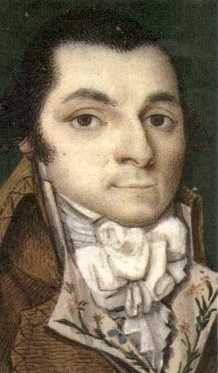Antoine Quentin Fouquier-Tinville
Antoine Quentin Fouquier de Tinville , later called Fouquier-Tinville [ fukˌjetɛ̃ˈviːl ], (born June 10, 1746 in Hérouël , Département Aisne ; † May 7, 1795 in Paris ) was a French revolutionary and public prosecutor ( Accusateur Public ) of the Revolutionary Tribunal during the French Revolution .
Life
Fouquier de Tinville was born in Hérouël, Foreste since 1843, a small town 16 km west of St. Quentin , and came from a wealthy family of old French nobility from Picardy . After a few detours, he studied law and worked for the public prosecutor's office from 1765 . 1774 bought it, after payment of a substantial inheritance from his family, the Office of the Prosecutor and married a year later in his first marriage his cousin, with whom he had five children. After the death of his wife, he remarried and in 1783 had to sell the office of public prosecutor again. Excessively in debt, he got a job with the royal police and in 1789 became a commissioner. With the support of his cousin Camille Desmoulins , he became head of a prosecution jury in 1792 . During the Revolution, he changed his name to Fouquier-Tinville to disguise his noble origins.
When the Revolutionary Tribunal was formed on March 10, 1793, Fouquier-Tinville was appointed public prosecutor; he held the office until July 28, 1794. Together with Robespierre , he turned it into a major instrument of the revolution. Outwardly, he wore the mask of independence and incorruptibility; in fact, his accusations followed the prevailing political wind, although he strictly refrained from personal gain. He was involved in around 2,400 death sentences (including those of his cousin Camille Desmoulins and Queen Marie-Antoinette ). He is also responsible for the conviction of Olympe de Gouges , who announced the Declaration des droits de la femme et de la citoyenne ( Declaration of the Rights of Women and Citizens ) as a reaction to the French Declaration of Human Rights . Although he came from a family loyal to the royal family and was related to numerous defendants himself, he did not consider origin, age, gender or status in his passionate accusations. Robespierre's fall on the 9th Thermidor , which he significantly supported , was gradually followed by his own descent. On August 1, 1794, the National Convention had him arrested and tried . In defense, he submitted that he was only following the orders of the welfare committee . After one of the longest processes of revolutionary history, the forty-one took days, he was like other responsible parties in the Revolutionary Tribunal (the judge Martial Herman ) sentenced to death and under large sympathy of the people on May 7, 1795 on the guillotine executed .
literature
- Jacques Castelnau: Fouquier-Tinville: Le pourvoyeur de l'échafaud . Hachette, Paris 1937
- Albert Croquez and Georges Loublie: Fouquier-Tinville, l'accusateur public . Julliard, Paris 1945
- Alphonse Dunoyer: Fouquier-Tinville: Accusateur public du tribunal révolutionnaire, 1746–1795, d'après les documents des archives nationales . Perrin, Paris 1913
- Hector Fleischmann: Les coulisses du Tribunal Révolutionnaire (Fouquier-Tinville intime) . Paris 1909
- Speeches by Antoine Quentin Fouquier Tinville, the public prosecutor in the French Revolution . Speaker of the Revolution Volume IV. New German publishing house. Berlin 1925
- Fritz Hochwälder : The public prosecutor , play in three acts, 1947. The play deals with the subject of revenge / justice based on the historical figure of the public prosecutor of the French Revolution, Fouquier-Tinville.
Web links
- Short biography and further links ( Memento from May 25, 2008 in the Internet Archive ) Short biography and further links
| personal data | |
|---|---|
| SURNAME | Fouquier-Tinville, Antoine Quentin |
| ALTERNATIVE NAMES | Fouquier de Tinville, Antoine Quentin |
| BRIEF DESCRIPTION | French revolutionary and public prosecutor of the Revolutionary Tribunal during the French Revolution |
| DATE OF BIRTH | June 1746 |
| PLACE OF BIRTH | Hérouël |
| DATE OF DEATH | May 7, 1795 |
| Place of death | Paris |


